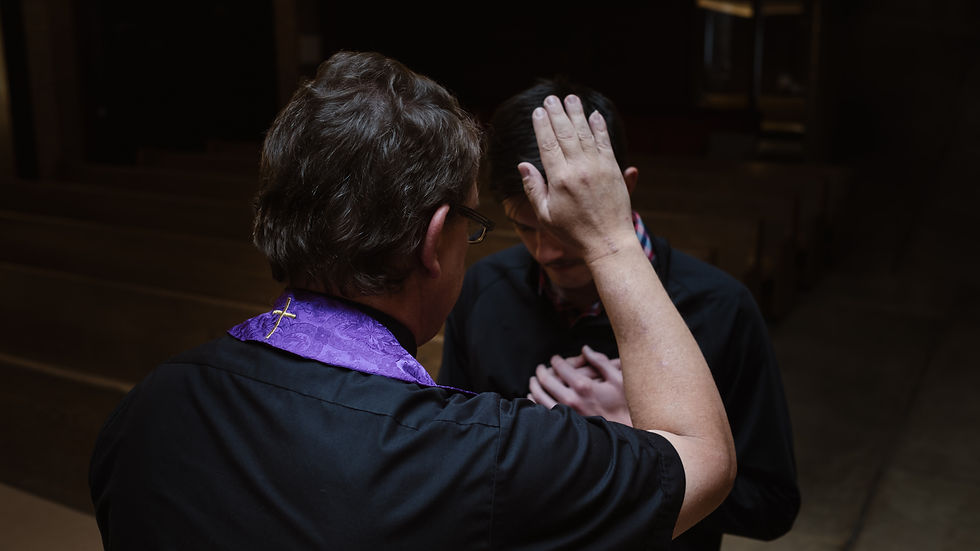Therefore confess your sins to each other and pray for each other so that you may be healed. The prayer of a righteous man is powerful and effective. James 5:16

Dear Friends in Christ,
Why do we confess our sins together in church? And why do we do so in almost every service? Our sins are what get in the way of our relationship with God, what injures our relationships with others and what injures the wholeness God wants for each of us. Sin can be seen as breaking God’s laws or going against God’s principles. Original sin is the one empirically verifiable truth of the Christian faith: none of us is perfect, and all of us need God’s grace.
Thankfully, God gives us his grace and mercy—God wants to reconcile us to him and to each other, and to make us whole. This is Jesus’ mission in his life, death and resurrection. So we seek his forgiveness and restoration. Confession involves truth telling about ourselves. We should confess our sins more explicitly to God in our own prayers. Be honest with God and with yourself—you can trust in God’s love for you, and that honesty is part of the path to your healing and repentance (doing differently the next time). We sometimes confess our sins to a priest or to a friend to pray for us and support our repentance. We also confess our sins together in community when we gather for worship. In part, we do this to prepare ourselves to encounter God in Word and Sacrament. We also confess our sins together to recognize our common need for forgiveness, and the way we sin as a community as well as individuals.
The confession can appear at the beginning of the service, as it does in the daily office (services of Morning Prayer or Evening Prayer). This is done as a preparation for worship. In the Eucharist, the confession usually appears at the end of the prayers of the people. The placement here is to put our forgiveness and absolution right before the Peace—right before Holy Communion with God and each other in Christ. In this way, confession and absolution is a preparation for this communion.
The words that we use in the confession are somewhat general in nature. You can hear the reference to the ‘summary of the law’ in the reference to loving God with all our heart (some services add ‘and mind and strength’), and loving our neighbor as ourselves. I find the version of the confession and absolution in the Rite I daily office much more vivid and expressive, really inviting our commitments into the conversation in explicit and concrete ways.
Almighty and most merciful Father,
we have erred and strayed from thy ways like lost sheep,
we have followed too much the devices and desires of our own hearts,
we have offended against thy holy laws,
we have left undone those things which we ought to have done,
and we have done those things which we ought not to have done.
But thou, O Lord, have mercy upon us,
spare thou those who confess their faults,
restore thou those who are penitent,
according to thy promises declared unto mankind in Christ Jesus our Lord;
and grant, O most merciful Father, for his sake,
that we may hereafter live a godly, righteous, and sober life,
to the glory of thy holy Name. Amen.
-BCP, page 41
This may seem heavily penitential, but there is a lot of hope in it too—resting on the promises of Jesus. Furthermore, the responding absolution is rich with meaning:
The Almighty and merciful Lord grant you absolution and
remission of all your sins, true repentance, amendment of
life, and the grace and consolation of his Holy Spirit. Amen.
-BCP, page 42
It is not the priest who forgives you, it is God who forgives you. But the priest is authorized to speak for the church in proclaiming God’s absolution to penitent sinners. Note that when lay people lead the service of Morning Prayer or Evening Prayer, the absolution is said by shifting the pronouns: “The Almighty and merciful Lord grant us absolution and remission of all our sins…”
What a relief to know that my sins no longer stand in the way of my relationship with God! But my hope is more than that—I want no longer to do such injury to my relationship with God, or injury to others or myself. So, what a blessing it is indeed to find true repentance—a true turn-around—a true transformation! And what grace for God to bring us to amendment of life, where what was broken might be restored or healed. And for those burdened by the memory of our mistakes, we indeed need the grace and consolation of the Holy Spirit. Now that we are forgiven, we can feel God’s presence and power in our lives again!
The next time that we say the confession together, take that moment of silence at the beginning to bring to mind those broken places that need to be confessed and brought to God. Bring them in all fullness to God during the confession. And then feel God’s grace and renewal in you in the absolution, and rejoice in sharing God’s peace with others like you who are blessed by God’s grace!
Yours in Christ,
-Tom
